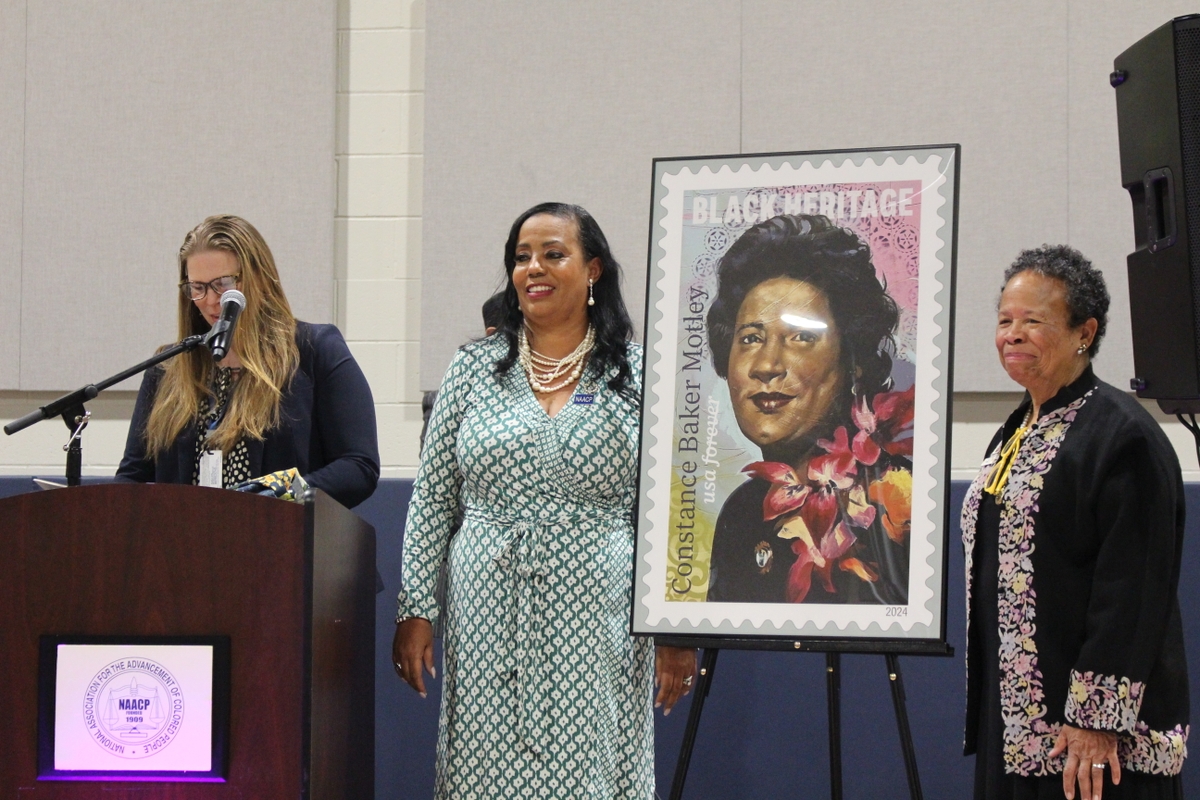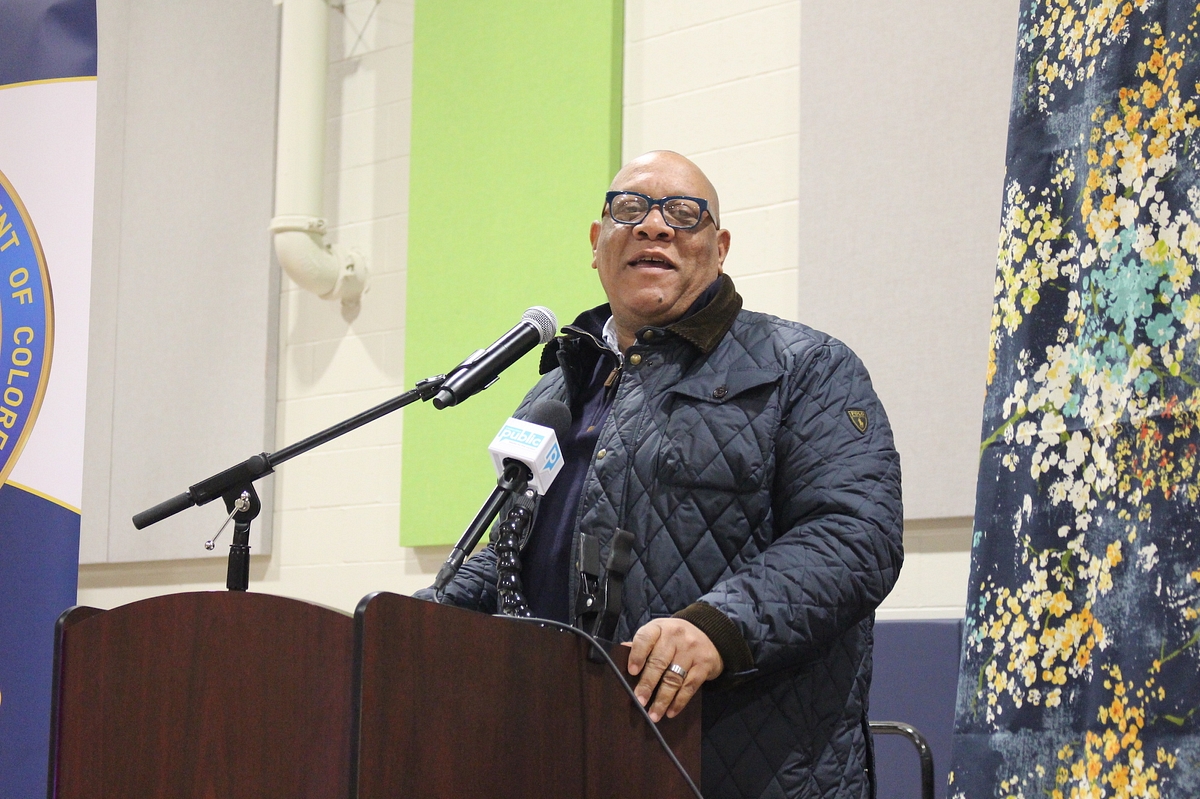
Yash Roy Photos
NAACP New Haven President Dori Dumas and Motley's niece Constance Royster unveil the stamp at Q House event.
Judge Constance Baker Motley was the only woman to work at the NAACP’s Legal Defense Fund during the Civil Rights Movement. She wrote the original complaint in Brown v. Board of Education. She was Martin Luther King Jr.’s lawyer. She was the first Black woman to argue a case before the U.S. Supreme Court, and she fought nine more desegregation cases, winning every single one.
She was a daughter of New Haven. She was a daughter of Dixwell. She was a daughter of the Q House.
Now she joins King, Rosa Parks, John Lewis, and Thurgood Marshall on a U.S. Postal Service Forever stamp.

The crowd at the Q.
On the first day of Black History Month, the Greater New Haven NAACP hosted an unveiling of the stamp, which was designed by Charly Palmer. Her stamp is the 47th in the Black Heritage Series.
New Haven NAACP President Dori Dumas and Motley’s niece Constance Royster unveiled the stamp Thursday evening at the place where Motley’s career started — the Q House community center. New Haven Mayor Justin Elicker, Connecticut NAACP President Scot X. Esdaile, NAACP National Board Vice-Chair Karen Boykin-Towns, U.S. Attorney Vanessa Avery, and more than 200 other New Haveners joined in the celebration.
“Knowing she was from New Haven, attended the same high school, went to the same church and was part of our NAACP makes her so special to me,” Dumas said.
“So, when we first found out that the United States Postal Service had chosen her as the 47th Black heritage stamp, well, we said, ‘It’s about time.’”
Motley was born in New Haven in 1921, the daughter of two Nevisian immigrants. Her mother was a domestic servant and helped co-found the New Haven NAACP. Her father was a cook for Yale’s secret societies, including Skull & Bones.
She graduated from Hillhouse with the highest honors, but her family could not afford her to attend college, even when her parents worked three jobs each.
That changed at a Q House town hall.
Called on by a group of largely Yale benefactors to ask the community why no one was using the Q House, Motley was the only person to stand up and tell them it was because no one had asked for the community’s input in the Q House.
Some of the benefactors did not like what she had to say. But one did: CW Blakeslee. He asked to speak to her after the meeting and asked her why she was not in college. When she told him her family could not afford it, he offered to pay
“This organization allowed her to hone her public speaking skills and helped her find her voice, use her voice, and caught the attention of CW Blakesley, who was so impressed by this dynamic woman that he paid for her undergraduate education and law school … That’s how impressive she was,” said Q House centennial committee Co-Chair Charles Warner.
“Her story started here, which is why it was so important for us to host this event here,” Dumas added.
The Q House is celebrating its centennial this year with a whole host of events throughout the year to highlight the past, present, and future of the space.
While her roots were in New Haven, Motley spent her career shoulder to shoulder with civil rights leaders across the country. Her strategy was the basis for almost every desegregation case, from lunch counters to universities. She lived under a constant threat of being killed, but she persisted, according to Avery.
“Imagine the courage and tenacity it took for a woman to do that, at that time,” Avery said, reading partially from a biography of Motley by Gary Ford. “Her contributions complicate the view of history, from the male model of leadership by charismatic men to a more complete model that is inclusive of women.”
While Motley made history as a judge, she was also a mother, daughter, and aunt who inspired her own family, noted Constance Royster, her niece.
Reading from an excerpt of Civil Rights Queen, another biography on Motley, by Tomiko Brown-Nagin, Royster called on attendees to learn more about Motley. “Far too few American today know her. Her likeness is not even featured on a postage stamp,” Royster said.
“That line is only a year and a half ago. Not anymore.”
Royster also pointed out that New Haven has no memorial for Motley. Yet.
Thursday’s event was not just a memorial of Motley. It was also a call to action.
“This is just an amazing way to kick off Black History Month and reflect on the past, and I think, more importantly, reflect on the work that we have ahead of us,” Elicker said. “We know her work is far from done.”
What does that look like in New Haven?
According to Esdaile, the state’s NAACP president, it’s organizing against the ongoing effort by the cops responsible for paralyzing Randy Cox to get their jobs back.
“We have to keep up her traditions here in New Haven, Connecticut, where she was born and raised,” Esdaile said. “There are some serious cases right here in New Haven, and I am talking about the Randy Cox case. … The fight is not over. The officers are now trying to get their jobs back. It’s imperative that the New Haven NAACP and the individuals of New Haven mobilize and get involved in action to stop this from happening.”
St. Luke’s plans to host another event commemorating Motley’s life and her stamp on Feb. 11.

Scot X. Esdaile: Work still left to do, right here at home.







Stamps are a great history lesson in so many ways... I've been going through my old stamp book recently, recognized that a lot of what I learned about American History was through stamp collecting.
Up until 1970, there were only four African Americans on US Postage Stamps - George Washington Carver, Booker T. Washington, Frederick Douglass and W.C. Handy. In the mid seventies saw the addition of two artists -- the painter Henry O'Tanner, the poet Paul Lawerence Dunbar as well as Revolutionary War Hero and Freed Slave, Salem Poor... just in time for the Bicentennial...
That is about when I stopped collecting stamps....
In 1978 Harriet Tubman was featured on her first stamp... Dr. Martin Luther King in 1979.
That 'rate' of one African American on Stamps per year stayed pretty true until the mid-nineties.
Now there are over 100.